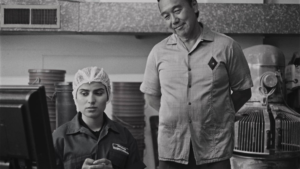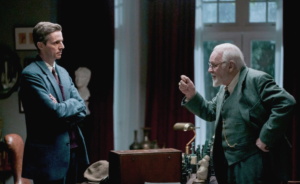Reviewed by GREG KING
Director: Melina Matsoukas
Stars: Daniel Kaluuya, Jodie Turner-Smith, Bokeem Woodbine, Sturgill Simpson, Chloe Sevigny, Flea, Indya Moore, Benito Martinez.

This searing drama offers yet another look at the parlous state of race relations and injustice in the US and fits neatly into the whole Black Lives Matter movement. Unlike a number of other films exploring racism in contemporary America through the perspective of white filmmakers, Queen & Slim is seen from the perspective of black filmmakers, which makes it all the more potent.
Lawyer Queen (Jodie Turner-Smith) and Slim (Daniel Kaluuya, from Get Out, etc) meet for the first time after connecting through on-line dating app Tinder. But their dinner date at a diner is awkward as their conversation is stilted and they find they really have little in common. There is no chemistry between them.
The night ends early and Slim drives Queen home. On the way they are pulled over by an overly aggressive and racist policeman (played by country singer Sturgill Simpson, from The Dead Don’t Die, etc), and the situation escalates. Queen is shot in the leg by the policeman and Slim shoots him in self-defence. Queen believes that the couple won’t get a fair hearing from the authorities and decides that the best course of action is to flee. This sets in motion a road journey, a bit like an African American variation on the classic Thelma and Louise, in which an innocent couple are forced to go on the run from the authorities.
The fatal shooting was captured on video and soon goes viral. The couple become outlaw heroes. The pair become a symbol of the fear, trauma, desperation, police brutality, racism and injustice faced by African Americans on an almost daily basis, and they are elevated to mythic folk hero status, and sometimes compared to the notorious Depression era gangsters Bonnie and Clyde.
At its heart though, Queen & Slim is a love story, of sorts, as well as a road movie replete with all the attendant clichés and tropes. When we first meet the couple we know little about them, but their backstories are slowly teased out as they travel across the country and grow closer. They head to New Orleans, where Queen hopes to find help from her estranged uncle Earl (Bokeem Woodbine) who she hopes will be able to get them to Cuba.
Written by Emmy award winner Lena Waithe (Master Of None, etc) and directed by Grammy award winning filmmaker Melina Matsoukas, this is a film designed to make you angry. The film deals with universal themes of love, guilt, racism and racial politics, black identity, freedom and discrimination. Waithe and Matsoukas have infused the material with that same sense of passion and anger that shaped some of the early incendiary films of Spike Lee (Do The Right Thing, etc). However, this is Matsoukas’ first feature film (she hails from a background in television and music videos) and her lack of experience shows in the uneven pacing. The script is driven by some unlikely coincidences and implausible moments that detract from the potent message the filmmakers are trying to deliver. The drama is also tempered with some moments of deadpan comedy.
However, there is genuine chemistry between the two leads who deliver strong, empathetic performances as the eponymous anti-heroes. Kaluuya is strong as the easy going and laid back Slim, and he brings a vulnerability to the character. In her first lead role, model turned actress Turner-Smith also has a strong screen presence as the more cynical but smart and pragmatic Queen. The cast also features indie favourite Chloe Sevigny and musician Flea as the friendly Shepherds, a white couple who help Queen and Slim.
Cinematographer Tad Radcliffe (Pride, etc) captures a nice visual contrast between some upscale neighbourhoods and ramshackle depressed rural neighbourhoods as the couple journey through several states on the way to Florida. He uses natural lighting where possible to give the film a strong visual aesthetic and treat us to a world not often seen on screen. There is one striking scene in which the pair drive past a field in which a number of black convicts in chains are clearing the land; this scene says more about the plight of African Americans in the eyes of the law than any ten pages of dialogue. The film also features a wonderful and atmospheric score from Devonte Hynes (aka Blood Orange) and a hip hop influenced soundtrack that includes Lauren Hill.
★★★☆



